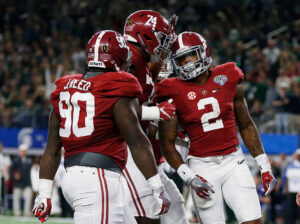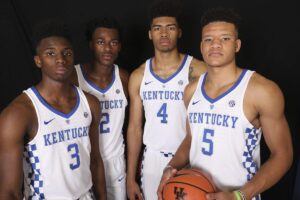Tag: college athletes
PCI: College Athletes Should be Expected to Stay More Than One Year
by The Cowl Editor on December 7, 2017
PCI
by Max Anderson ’18
Sports Staff

I believe that athletes, when faced with the decision to enroll at a college or university, or turn pro, should be given a choice: either enter professional sports right out of high school, or complete a minimum of two years at college. I believe this rule change makes the most sense for athletes.
One of the biggest issues facing sports today is whether professional sports leagues are holding athletes back by forcing them to attend college. Many high school athletes, whether they play basketball, baseball, football, hockey, soccer, or any other sport, come from tough backgrounds, and want to make money as quickly as possible to help their families.
Others feel that college simply will not benefit them in any way, and feel that they are ready to take the next step now rather than later. If a high school athlete falls into either of these categories, who are we to restrict them from turning professional now?
However, if a high school student feels that they would like to attend college and receive an education, they should be required to complete a minimum of two years at the collegiate level. This way, the student can receive four semesters (or quarters depending on where they attend) worth of education, which can at least benefit them if their professional sports career does not work out.
The main reason that leagues such as the NFL and MLB requires athletes to stay a minimum of three years in college before turning pro is so that these students can receive three years’ worth of education to help them later in life. However, that third year may be holding athletes back, as many may be ready to turn professional after two years, but are unable to do so thanks to these rules and limitations. With this new rule, I believe athletes can not only receive a proper education, but also turn professional if they feel they are ready.
PCI: College Athletes Should Not be Expected to Stay More Than One Year
by The Cowl Editor on December 7, 2017
PCI
by Meaghan Cahill ’20
Sports Co-Editor

Athletes leaving their respective colleges to go pro before graduating is not a rare occurrence in college sports today. Players such as Boston University’s Jack Eichel and Charlie McAvoy and Providence College’s own Noel Acciari and Ben Bentil, have all left their respective teams to pursue a professional career before they were supposed to graduate and rightfully so. Each of these players have moved on from their college programs and are currently very successful players in both the NHL and NBA.
While it can be argued that college athletes should remain all four years with their college sports team, it is not right to expect them to stay. Becoming a professional athlete is a goal that not many athletes have success in achieving. So, when the opportunity presents itself, the players should be allowed to have a chance to take it with nothing holding them back. If a player is expected to wait around until they graduate college, they risk the chance of injury, which would end whatever chance they had at a professional career all together.
There are many perks towards college players leaving their school programs early as well. For starters, they get a head start at actually having a career and making a living. In the case of McAvoy, who is now a top defenseman for the Boston Bruins, at just nineteen-years-old, is earning $925,000 a year with his entry level contract. With this kind of money, athletes are then able to provide for their families and create their own financial stability. Another reason that leaving college to become a professional athlete can be beneficial is that they can always go back to their studies when their professional career is over. If it was the other way around, the chance for a player to go back to their athletic career might not be possible. Also, much like Dallas Stars player and former Bruins player Tyler Seguin did, professional athletes are also able to take classes in between their sports season.
College athletes should not be expected to stay in college for all four years should they get the opportunity to go pro. The opportunity itself is one that is very hard to come by and may not come around again. First and foremost, especially at a high collegiate level, athletes are athletes and at the end of the day, they need to base their decisions off of their sports career, not their college degree.
PCI: College Athletes Should be Paid
by The Cowl Editor on November 30, 2017
PCI
By Chris McCormack ’18
Sports Staff

The NCAA has a severe money problem. In 2016, the collegiate sports organization posted a revenue of $995.9 million. Meanwhile, the athletes, who are to thank for this revenue, do not see a dime of this.
Many argue that they get paid with a free tuition, which should be enough. However, many of the athletes are not there for the education. As disappointing as this may sound to some, this is the sad truth.
For example, many of the top athletes in college basketball are there for one year and leave for the NBA, either because they have the skills necessary or they are in desperate need of the money. Plenty of athletes come from lower-income areas and families which makes the money that much more appealing. If the NCAA paid their athletes, more players may stay longer because they no longer have the desperate need for the money the NBA has to offer.
Both college football and basketball are multi-billion dollar industries and possess the ability to pay the coaches large million-dollar contracts. Why does it make sense for the coaches to bring in large sums of money to support their families and lifestyles but the athletes, who are the ones drawing the attention to the sport, do not have this benefit?
A study came out this year that put a value on the athletes of many Division I schools. Texas had the highest value per player at $670,000, and Alabama came in second with a value of $536,485. The Division I-A average came in at a substantial $163,689. None of these amounts are small to the average athlete.
However, the NCAA thinks paying players is unethical because the athletes are there for the education. At the end of the day, it is not going to be easy for the current rules to change. The people running the NCAA love the paychecks they get from the money that is brought in by the players, and the head coaches are not going to complain about the millions of dollars they get from the institutions. However, until changes are made, I would not be surprised to see more corruption scandals pop up like the one we saw earlier in the year.
PCI: College Athletes Should Not be Paid
by The Cowl Editor on November 30, 2017
PCI
By Ethan Ticehurst ’18
Sports Staff

College athletes should not get paid. There is no acceptable reason why athletes should be paid. The payment for their services is the education that they receive at their institution.
The main argument for paying college athletes is that the NCAA is making a lot of money off the sale of merchandise and the players should be allowed to partake in the fruits of their efforts. It seems that proponents of this argument have forgotten about the true purpose of college. They have forgotten that the main point of college is to educate, not to play sports. There are athletes all across the nation that get athletic scholarships to come and play a sport for a few years and get an entirely free education. Their payment for their athleticism is the education that they receive for free and no monetary compensation should be added on top. Even athletes that are not on scholarship are getting the benefit of an education and do not need to be paid for anything that they are accomplishing.
The real problem in this whole argument are the actions of the NCAA. It is true that the NCAA is making money unfairly off of the accomplishments of their athletes. But, instead of trying to stop the unfair activity, proponents of athlete pay want to keep the unfairness going, just as long as the athletes get a share of it. This is a classic example of one of those situations where everyone is offended by something until they benefit from it themselves.
